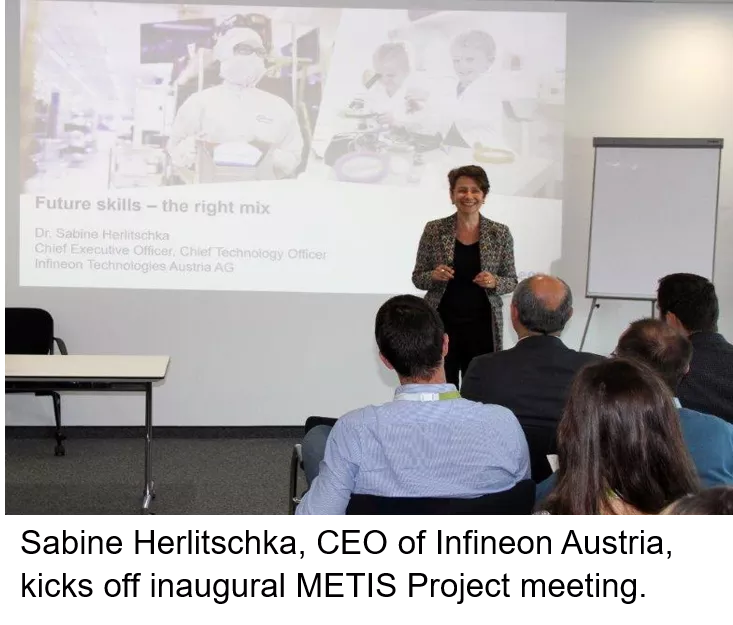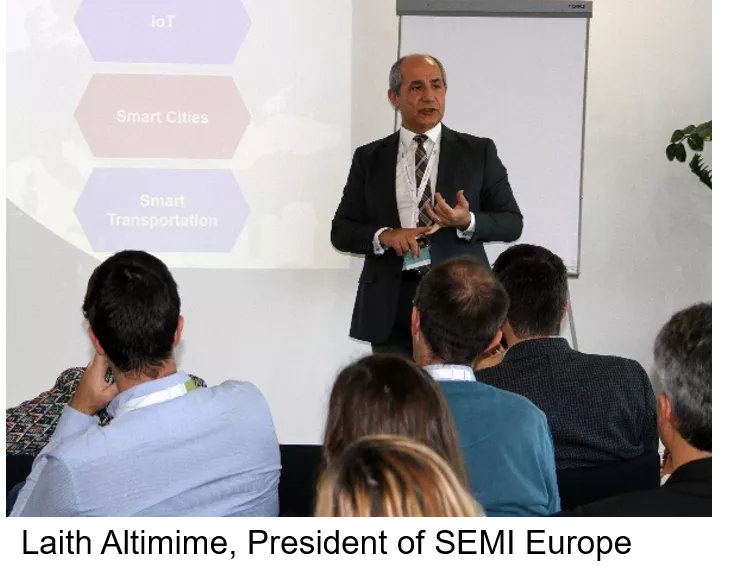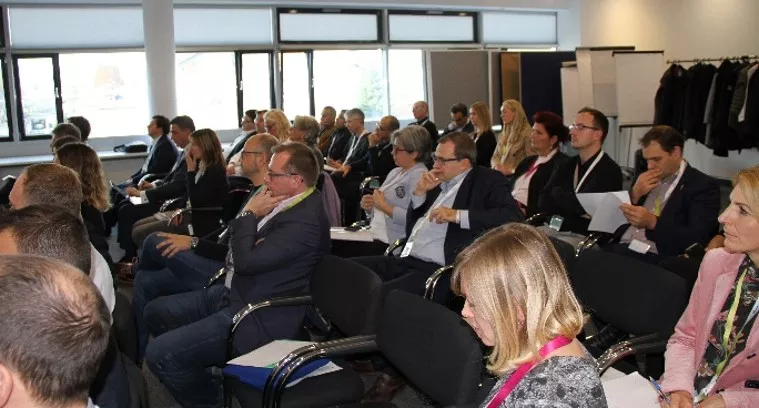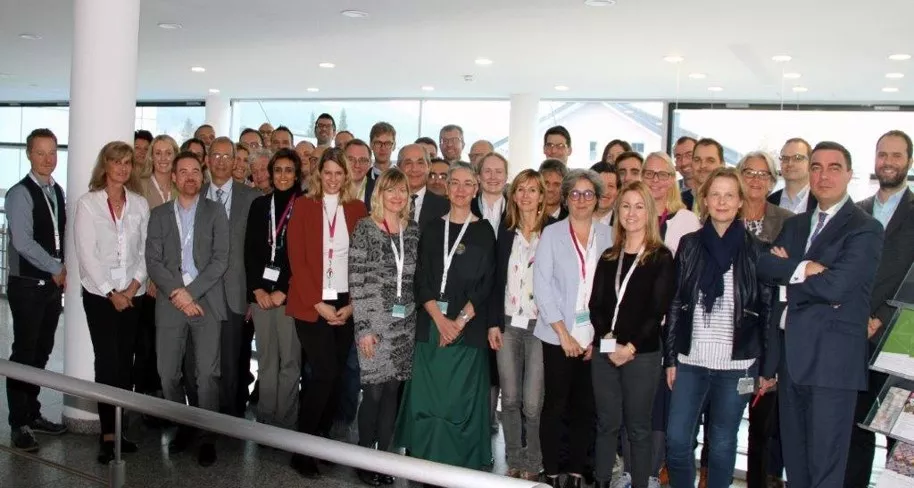
Taking aim at the workers and job training needed to drive microelectronics innovation, 50 members of the recently formed Microelectronics Training, Industry and Skills (METIS) consortium met for the first time in November 2019 to lay out the broad outlines of their work to develop a comprehensive strategy for bridging the skills gap in Europe’s microelectronics industry. Representatives from the consortium of 20 partners from 14 European countries gathered to identify the worker skills and related training the microelectronics industry direly needs to support innovation in artificial intelligence (AI), autonomous driving, Industry 4.0 and other leading-edge market verticals.
A Sector Skills Alliance co-funded by the Erasmus+ Program and coordinated by SEMI, METIS is designed to overcome the skills shortage in the electronic components and systems value chain. Following are the takeaways from the event hosted in Villach by Infineon Austria.
1. The consortium must anticipate future skills the industry needs.
 To do this, it must survey as large as possible a pool of industry experts, students and trainers for insights. As part of its work, METIS plans to build occupational profiles that detail job competencies in the greatest demand. Based on gaps in current educational offerings, the members highlighted the need for upskilling in semiconductor design and materials, cybersecurity, sustainability among new potential target areas for curricula.
To do this, it must survey as large as possible a pool of industry experts, students and trainers for insights. As part of its work, METIS plans to build occupational profiles that detail job competencies in the greatest demand. Based on gaps in current educational offerings, the members highlighted the need for upskilling in semiconductor design and materials, cybersecurity, sustainability among new potential target areas for curricula.
The profiles must reflect the industry’s need for workers with interdisciplinary skills. For example, microelectronics professionals need to be equipped with not only analog design and basic programming skills, but soft skills in areas such as leadership, creativity and time management.
2. METIS will develop a comprehensive Microelectronics Skills Strategy.
The microelectronics industry holds the key to solving major global challenges, and the supply chain has grown to create unprecedented innovation opportunities in the microelectronics ecosystem. Given the undisputed importance of the sector, the much-needed skills strategy will outline a set of actionable measures to address the skills gap in Europe until 2030. To do this, the consortium will identify global societal and economic trends, conduct extensive research on the skills supply and demand, and analyze tangible best practices.
3. Innovative learning tools will be incorporated in the METIS training.
 Massive Open Online Courses (MOOCs) provide the ideal educational environment to enhance active learning. That is why the METIS learning platform will combine traditional lectures with highly interactive, online educational materials The METIS curriculum will be based on multiple modules, evaluation mechanisms and certification procedures. The consortium agreed that a prerequisite for the training’s efficiency is its adaptability to different learning styles, as well as its forward-looking “edutainment” approach.
Massive Open Online Courses (MOOCs) provide the ideal educational environment to enhance active learning. That is why the METIS learning platform will combine traditional lectures with highly interactive, online educational materials The METIS curriculum will be based on multiple modules, evaluation mechanisms and certification procedures. The consortium agreed that a prerequisite for the training’s efficiency is its adaptability to different learning styles, as well as its forward-looking “edutainment” approach.
4. METIS outreach will be key to its success.
Reaching young students and, to help influence their education and career decisions, their families, METIS plans to promote the microelectronics sector as a career destination starting in primary education with an emphasis on young women and other underrepresented groups such as migrants. Program communications will also target experienced professionals considering a career transition, national and local governments whose initiatives dovetail with METIS goals, and civil society. Serving as the European voice for the microelectronics sector in workforce development, the consortium will provide a sustainable link of industry with academia.
5. METIS will take on big challenges.
METIS aims to contribute to tackling societal challenges with the greatest impact on microelectronics.
These challenges include:
- The microelectronics sector suffers from a severe lack of diversity, with women representing from as little as 10 percent of the workforce, despite evidence that diverse organizations perform better, are better at innovation, better at retaining talent, are more satisfying places of employment, and more likely to succeed in new markets. METIS will provide gender informed and relevant curricula and focus its outreach activities on the groups that are under-represented in the sector.
- With electronics suppliers featuring many intercultural and intergenerational teams, language barriers and cultural differences often pose obstacles. With a diverse consortium comprised of organisations from 14 countries, the METIS training will be available in many languages and adapted to different learning cultures.
- The image of the industry as an unattractive career destination makes it difficult to attract young workers. In response, METIS will enhance the visibility of the microelectronics sector as a professional option, hence contributing to reversing the negative trend of limited awareness of microelectronics in society.

METIS partners exchanged ideas about project objectives and implementation.
A look ahead
Promoting digitalization in education, METIS is the first and only program designed to establish a European microelectronics education path.
Over the next four years, the project will establish a Microelectronics Skills Strategy, deliver the METIS training, and establish a durable EU Microelectronics Observatory and Skills Council as a permanent and sustainable governance structure that will monitor the labour market, investigate the future trends of the sector and forecast skills requirements.
The METIS consortium represents industry, education and training providers, non-governmental organisations and certification bodies. It consists of Infineon, Bosch, X-FAB, Graphenea, Summa, Arcelik, Silicon Saxony, imec, Technical University of Graz, Dresden Chip Academy, University of South-Eastern Norway, Technical University of Sofia, Budapest University of Technology and Economics, IAL-FVG, Fast Track into Information Technology, European Association of Career Guidance, European Association for Women in Science, Engineering and Technology, CIMEA, DECISION and SEMI.

METIS consortium inaugural meeting attendees
The next meeting will be hosted by X-Fab France in May 2020.
Stefania Garva is a public affairs manager at SEMI Europe.